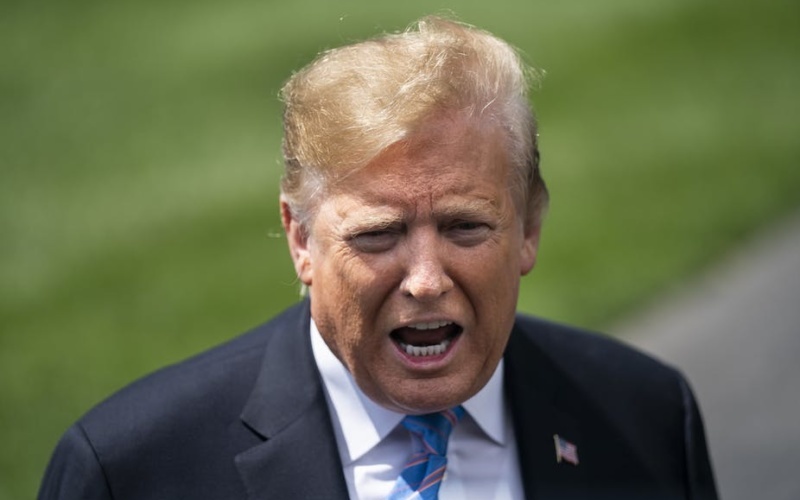“For Trump, it is the illusion of success, rather than actual credibility or effectiveness which matters” (Jim Lo Scalzo/EPA)
Co-written with Scott Lucas for The Conversation:
Donald Trump has caused a furor by promising to impose a 5% tariff on goods coming into the US from Mexico unless the problem of undocumented immigration across the border is addressed. Linking tariffs with his anti-immigration campaign, the American president was unequivocal:
He has repeated the warning each day since, complete with distorted claims about migration and drug flows into the US. He has overruled his senior advisers who argued against tariffs, including son-in-law Jared Kushner, treasury secretary Steven Mnuchin and trade representative Robert Lighthizer. And he has risked Congress refusing to ratify a revised North American Free Trade Agreement.
But will he succeed in obtaining a Mexican capitulation, halting any migrant moving through the country from crossing into the US?
Credibility and Capability
Any threat needs to be sufficiently credible – your target needs to be believe that you will pull the trigger.
In this case, any shot fired could wound the US as much as, or even more than, Mexico. The US runs a goods and services trade deficit with Mexico, the country’s third-largest goods trading partner, which reached $72.7 billion in 2018. The purported 5% tariff would impose a $17 billion tax on American businesses and consumers, a fact not lost on Senate Republicans who oppose Trump’s strategy. The damage to American exporters could be even more dire if Mexico follows through on warnings by its foreign minister that it would take retaliatory measures to any tariffs.
Because of the intricate ways that migration bind countries together, cross-border mobility can be linked to other foreign policy issues – but the credibility of any threat is key. Turkey succeeded in 2016 when its threat of allowing irregular migrants to find their way into the European Union led to enough raised eyebrows that it secured a €6 billion deal. But Iran’s warning in May 2019 that it would begin deporting Afghan refugees in the face of continuing American sanctions barely made international news – it was an implausible threat given the role that Afghans play in the Iranian economy.
At the same time, the demand that Mexico “stop the flow of people and drugs” overestimates Mexico’s capacity to respond. The threat carries a degree of irony in commanding the Mexican government to do what the Trump administration has been unable to do: control the increasing numbers of Guatemalan, Costa Rican and Honduran nationals who are seeking refuge in the US.
Far from stemming migrant flows through Mexico, Trump’s tariffs could weaken the economic position of America’s neighbor. The country’s traditional role as a buffer state for transit immigration could also be undermined.
Coercive migration diplomacy relies on a blackmailer’s ability to secure a realistic payment from a target. In 2017, Saudi Arabia debated using Lebanon’s dependence on migrant remittances as leverage in order to force authorities to take a tougher stance on Hezbollah. But it realized this was an impossible task: the structural weaknesses of the Lebanese state and Hezbollah’s close relationship to it would make compliance with such a demand unlikely.
Similarly, Muammar Qaddafi’s 1994 decision to deport hundreds of Palestinian migrants from Libya to disrupt the Israeli-Palestinian peace process did not produce any tangible results. But the Libyan leader’s machinations did obtain financial and political concessions from Europe in the late 2000s, including an apology for colonialism by Italy’s prime minister, Silvio Berlusconi.
Trump’s approach also suffers from a lack of concrete, measurable aims. It actually fits a pattern of threat-and-retreat that characterizes the administration’s approach to migration diplomacy – from the recent threat to shut the southern border between the US and Mexico, to older threats of halting remittances to coerce Mexico into paying for the border wall.
But this vagueness also grants Trump with sufficient leeway to declare he is satisfied with any policy changes and move on. In fact, Mexico has wisely attempted to diffuse bilateral tensions by adopting a conciliatory tone, while ostensibly stepping up its crackdown on migrant caravans.
The Illusion of Winning
But little of this will concern Trump – because it is the illusion of success, rather than actual credibility or effectiveness which matters.
Just after becoming president in January 2017, he gave away the game with Mexico and his border wall. Having thundered throughout his campaign that the Mexicans would pay for the wall, Trump told Mexico’s president, Enrique Peña Nieto, that he was not serious – and asked his Mexican counterpart not to expose the ruse: “We should both say, ‘we will work it out’.”
Almost two and a half years later, look for Trump to obscure failure to check the movement of migrants with a declaration of satisfaction with Mexico’s response as he moves on.
In the meantime – and all the way through the president’s 2020 re-election bid – migrants will be the ball in the political shell game. And until Trump tires of this gambit and lifts the threat of tariffs, so will the American and Mexican economies.![]()

